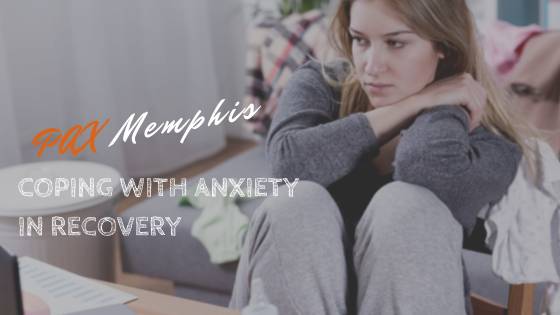Many people who suffer from addiction use drugs and alcohol to cope with or numb emotions. However, when you get sober you have to learn how to cope with unpleasant emotions in healthy ways. It is common for people in early recovery to experience high levels of anxiety. After all, you will experience a wide range of changes and life adjustments. You may feel pressure from trying to balance work, recovery, family, and your treatment program. In addition, some people who have a substance use disorder also suffer from an anxiety disorder. Regardless, feelings of anxiety are a normal part of life – how you cope with them is what matters.
What is Anxiety?
Anxiety describes the body’s natural response to stress or fear. However, if these feelings last longer than six months and are affecting a person’s quality of life, he or she may have an anxiety disorder. There are several different types of anxiety disorders, including:[1]
- Panic disorder
- Phobia
- Social anxiety disorder
- Obsessive-compulsive disorder
- Post-traumatic stress disorder (PTSD)
- Separation anxiety disorder
- Illness anxiety disorder
- Generalized anxiety disorder (GAD)
Feeling anxious from time to time is completely normal. Sadly, anxiety disorders can severely affect a person’s quality of life. Whether you have an anxiety disorder or simply experience anxiety in recovery, learning how to cope is essential to achieving sobriety.
The Link Between Anxiety and Substance Use Disorders
People who suffer from anxiety sometimes turn to drugs or alcohol to cope. However, this type of self-medicating can be dangerous because it can quickly turn into an addiction. On the other hand, drug and alcohol addiction causes the brain to be dependent on a substance. As a result, the body usually experiences anxiety, depression, and other mood changes when a person stops using them.
A study published in the Journal of Psychiatric Services estimates that 48% of people with substance use disorders also suffer from significant anxiety.[2] While addiction and anxiety commonly co-exist, sometimes anxiety develops in recovery but other times it can be a contributing factor to substance abuse. Without coping mechanisms for anxiety, a person may struggle to maintain his or her sobriety.
Ways to Cope with Anxiety in Sobriety
Whether you have an anxiety disorder or not, know that it is normal and expected to experience anxiety in early recovery. Here are a few effective ways to cope with anxiety in sobriety.
Meditation
Meditation is widely known to help treat an array of mental health conditions, including addiction. However, meditation can be transformative when used for anxiety. In fact, you can do a simple search for guided meditations for anxiety and find a plethora of results. The key to meditating for anxiety relief is to focus on your breath and stop judging your thoughts. This relaxation technique can help calm down the physical and mental symptoms of anxiety.
Talking it Out
Anxiety only gets worse if you keep your thoughts to yourself. Consequently, it is critical to talk to a member of your support group if you feel anxious. Talking about anxiety helps take power away from it. As your anxiety becomes more manageable, you may be able to think more clearly and make better decisions. In addition, your support group may be able to offer you advice that will help your anxiety go away.
Grounding Techniques
Sometimes, anxiety can make you feel as though the world is spinning and you can’t keep up. When this happens, it is easy to obsess over anxious thoughts. Instead of sitting in this anxiety, you can try some grounding techniques. Grounding techniques rely on the senses. For example, you can focus on 3 things you can smell, touch, see, and hear. This will help you return to the present moment and gather your thoughts.
Exercise
Studies show that exercise is just as effective as meditation for anxiety relief.[3] People who are physically active often experience lower rates of anxiety than sedentary individuals. Exercise releases endorphins to help boost a person’s mood and decrease anxiety and depression. Therefore, since exercise can improve mental health, it is a great asset in recovery. If you find yourself feeling anxious, take a walk or short run outside – it’s likely that you will feel better.
Journaling
When anxiety hits, a million thoughts may be running through your mind. In order to see the situation clearly and work through your anxiety, you can write down your anxious thoughts. Seeing your thoughts on paper will not only allow you to think clearly, but it can be extremely soothing as well.
Treatment for Anxiety and Addiction
Getting treatment for addiction won’t eliminate anxiety. Instead, anxiety is something that treatment can help individuals begin to manage. A comprehensive addiction treatment program will use cognitive behavioral therapy and holistic therapy to help treat anxiety. However, it is up to the individual to utilize these tools after leaving treatment.
Even though anxiety is expected to occur, there are healthy ways to cope with it in sobriety. Anxiety doesn’t have to disrupt your sobriety, and it doesn’t have to lead to relapse, either. Find the help you need today for anxiety and addiction.
References:
Medically Reviewed: September 25, 2019

All of the information on this page has been reviewed and verified by a certified addiction professional.










